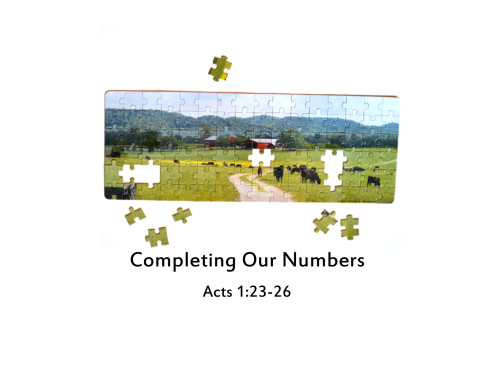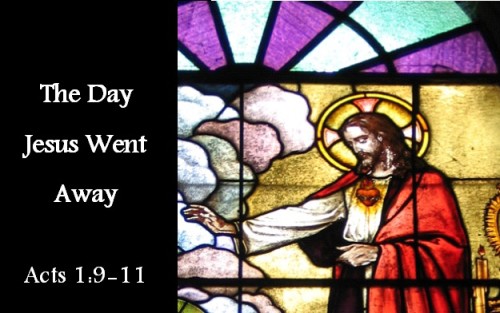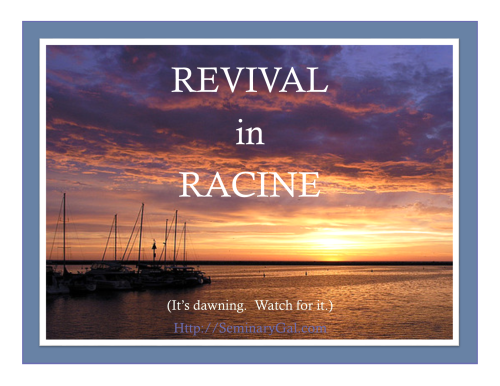 Ever been betrayed?
Ever been betrayed?
We don’t need to see a show of hands, but I would imagine that most of us can think of a time we’ve been betrayed. Maybe it was someone you trusted as a good friend or a valued coworker who stabbed you in the back. Maybe it was a boyfriend or girlfriend who cheated on you. Maybe it was a family member who took the opportunity to knock you down, tried to control you, maybe abused you, or lied about you to others.
Maybe you’ve felt betrayed by your politicians, your leaders, and let’s face it: the present national landscape is littered by pastors who betray us by their moral failings as spiritual leaders. Maybe that betrayer is yourself: your own body. When I had cancer, I felt that way…like my body had rebelled against me and all I’d tried to do with a healthy lifestyle. Eat well. Get exercise. What did I get for my efforts? Cancer, surgery and a long recovery. It’s pretty safe to say that I felt betrayed….by myself.
Maybe you have felt like God has betrayed you. You tried, you prayed, you read the Bible, you worshiped, you gave to the ministry, you worked hard, you poured your heart and soul into serving Him and then Wham! Bad stuff happened. It can feel like betrayal.
What should be our response to such betrayals? How can we handle betrayals to be more Christlike and better people…instead of sinking into bitterness, resentment, anger and gloom of doubt?
You see, if faith, hope, grace, and love are 4 great Christian virtues, then bitterness, resentment, anger, and doubt stand as wicked options that will happen if we don’t learn to Handle Betrayals with Grace.
Today, let’s aim for the virtuous life by looking at Acts 1:12-20 and see how the early church dealt with betrayal.
In the flow of Acts that we’ve been looking at over the past several weeks, the disciples had been overjoyed at the Resurrection appearances of Christ, they’d been instructed to wait for the Holy Spirit, and then Jesus left them. Alone. Staring into the clouds. Wondering, now what?
Kind of like that scene from Forrest Gump where all the runners are running along behind Forrest Gump who had been running back and forth across the country. Suddenly he stops and says, “I’m tired. I think I’ll go home now” and then all the people are like “What are we supposed to do now?”
The disciples—who we must remember were real people with real emotions–probably felt that way. Jesus went away. They didn’t understand. The disciples are informed that Jesus will come back in the same way that He left. They aren’t told when.
When faced with uncertainty and confusion, they could have felt betrayed by Jesus, or begun to reflect in total bitterness about how this all came to pass. They were once a happy group of 13. Jesus was their leader. They were 12 happy disciples who were chosen by the Son of God Himself! Everything was great…until Judas betrayed Jesus. With a kiss, no less.
They could have sunk into gloom at betrayal, but instead, our Scriptures today give us a 4 good reminders at how to handle betrayals with grace. Let’s look at how the disciples of Christ did it:
- Productive activities can help us to handle betrayals (such as prayer, fellowship, and worship)
- Knowing God’s Word reminds us of God’s sovereignty. Nothing escapes His attention–even human betrayals can work for His glory
- Separating the facts from our feelings about them. We see the “rest of the story” regarding Judas who is kind of the poster boy of betrayal. Judas’ example reminds us of how God can take even bad stuff the world dishes out for His glory.
- Forgiveness. There is a divine necessity of putting betrayals behind us and learning to forgive.
First, there are activities that can help us to handle betrayals:
Acts 1:12 Then they returned to Jerusalem from the hill called the Mount of Olives, a Sabbath day’s walk from the city. 13 When they arrived, they went upstairs to the room where they were staying. Those present were Peter, John, James and Andrew; Philip and Thomas, Bartholomew and Matthew; James son of Alphaeus and Simon the Zealot, and Judas son of James. [Note: all 11] 14 They all joined together constantly in prayer, along with the women and Mary the mother of Jesus, and with his brothers.
The first activity we can see is that they didn’t give up on the fellowship of believers. They circled the wagons and stuck together as the 11 remaining disciples, the followers of Christ. They stayed together. They joined constantly in prayer along with the other disciples.
They remained in fellowship. They constantly prayed together as of one mind. Why is this important? Because when we’re alone, we’re more likely to sink into a “woe is me” mindset and get depressed, resentful, and bitter. When I’m in the context of others, I can see I’m not the center of the universe with the world revolving around me and my pain. It forces me outward, to see a world in which we are better together and can support one another.
If you’ve ever seen a brick arch, you’ve probably noted that all the bricks can be the same size and shape. Remove any one of them and the arch collapses. Some arches have a capstone (one that is wedge-shaped) that gives even greater stability. Scripture tells us that Jesus is our capstone, and when the Body is together, He is still with us as our capstone, not a brick is missing, and we are a stable strong group of disciples. Sticking together is really important.
But more than that, they prayed together as of one mind. Total unity! They joined together constantly in prayer, which is an act of worship. Why is that important? Well, Scripture tells us that agreeing with Jesus through prayer and worship set the stage for handling betrayals:
Matthew 18:15 “If your brother sins against you, go and show him his fault, just between the two of you. If he listens to you, you have won your brother over. 16 But if he will not listen, take one or two others along, so that ‘every matter may be established by the testimony of two or three witnesses.’ 17 If he refuses to listen to them, tell it to the church; and if he refuses to listen even to the church, treat him as you would a pagan or a tax collector. 18 “I tell you the truth, whatever you bind on earth will be bound in heaven, and whatever you loose on earth will be loosed in heaven. 19 “Again, I tell you that if two of you on earth agree about anything you ask for, it will be done for you by my Father in heaven. 20 For where two or three come together in my name, there am I with them.” 21 Then Peter came to Jesus and asked, “Lord, how many times shall I forgive my brother when he sins against me? Up to seven times?” 22 Jesus answered, “I tell you, not seven times, but seventy-seven times.”
Ok, “Time out! Problem,” you say! “Judas was dead. There was no confronting him about his sin.” You’re right. But Jesus still says, that if two or three witnesses come together in His Name, He is there among us. Even before the Holy Spirit came. Jesus is interceding for us, and on this side of Pentecost, we have the Holy Spirit to be Jesus’ ongoing presence among us. The Body of Christ, that arch of support, will not falter as long as we stick together in fellowship and prayer, for worship of God alone. We prayerfully seek God’s presence among us to teach us how to forgive…yes, seventy-seven times, which is a number not to be counted but one showing forgiveness is an ongoing necessity.
I know, learning to forgive sounds easier than it actually is for many of us, but we’ll get to that in a moment.
Point 2: Knowing God’s Word reminds us of God’s sovereignty. Nothing escapes His attention—and even human betrayals can work for His glory
Acts 1:15 In those days Peter stood up among the believers (a group numbering about a hundred and twenty) 16 and said, “Brothers, the Scripture had to be fulfilled which the Holy Spirit spoke long ago through the mouth of David…”
Scripture tells us that this betrayal by Judas was a divine necessity. Scripture HAD TO BE fulfilled. This betrayal and Crucifixion were foretold and not an example of God’s being gone on a summer vacation in the North Woods and Satan sneaking something past Him.
To be sure, I struggle with the idea that bad things happen to people while God is watching. It seems as though the old notion ought to be true that IF God watches bad stuff happen THEN He’s a bad God. And it would be…IF God did one of two things: (1) passed over the bad stuff and just said, “OK. Works for me!”…or (2) if He watched, allowing it to happen because He was powerless to do anything about it.
But here’s the key: the Crucifixion WAS God’s doing something about bad stuff in this world.
Again, the key is that the Crucifixion WAS God’s doing something about bad stuff in this world.
Ever since the fall of man, we’ve had sin ruling humanity’s world. We wouldn’t want a God who said, “You know, Barb is a pretty nice person. She tries really hard. She has her faults, but she’s really trying to obey and her sin? Well, it’s an acceptable level so let’s just call it a clean slate.” That God would not be good! There is no “acceptable level of sin” for a holy God. Nor would we want a God who was constantly scanning our lives for hidden faults like divine antivirus software and bingo! Found it! And then He obliterates us because we’re a malware blight on the surface of the earth. Destroying us because of sin we inherited from Adam wouldn’t make for a good God either.
God has never—Never!—whitewashed my sin or given me a pass on the consequences of mortality–all the sicknesses and worries of this world that are the direct consequences of the fall of man. Sin does not “work for Him” and He wasn’t powerless to do anything about it!
God did something BETTER: He sent Jesus.
He punished my sin by taking it on Himself. He freed me from the eternal consequences, but while I’m here on earth, you know what? Bad stuff still happens. It happens to me and it happens to you. Sometimes it happens in the form of betrayals by our bodies and betrayals by others. We’re living in the tension of redemption already secured in the heavenly realms even while we’re still stuck here on earth.
What’s my point? Just this: the eternal scope is something we cannot comprehend. God’s knowing everything and being all powerful and over all means that even when bad stuff happens to us, it’s not without redemptive value. Job could tell us that! God—and we can take this to the bank—God will use what has been bad in our lives for some kind of eternal good. Maybe ours. Maybe someone else’s. Maybe to remind us that all humanity is broken and there’s a reason why the Gospel is such incredibly good news.
So it follows, Point #3: Separating fact from feelings, we can see that even human betrayals can work for God’s glory. It did with Jesus and He was betrayed by the modern poster boy of betrayal: Judas.
If you stop to think about it, the original poster boy of betrayal was Adam, the poster girl was Eve…who together had everything perfect and wonderful and God’s presence and the whole 9 yards, but then betrayal! By listening to the adversary, they gave up on God in the fall of man. But maybe part of our problem is that we’ve fictionalized that. Oh, it was a long time ago so we seem to forget how bad that really was. So we now have Judas—whose name is pretty synonymous with betrayal. Worse than Benedict Arnold who was a mere traitor.
So, Peter stands up among all these disciples and recounts the facts of what happened to Judas (note he’s recounting facts instead of dwelling in his feelings): Acts 1:16 concerning Judas, who served as guide for those who arrested Jesus—17 he was one of our number and shared in this ministry.” 18 (With the reward he got for his wickedness, Judas bought a field; there he fell headlong, his body burst open and all his intestines spilled out. 19 Everyone in Jerusalem heard about this, so they called that field in their language Akeldama, that is, Field of Blood.) 20 “For,” said Peter, “it is written in the book of Psalms, “’May his place be deserted; let there be no one to dwell in it,’ and, “’May another take his place of leadership.’
Do you see how this is a focus on the facts and not how Peter felt about it? Peter was a real person and I tell you, if I’d been one of the 12, which I’m not nearly that old, I’d have been royally ticked at Judas. I would have thought, “He was one of us! How could he do this? How could someone be so evil as to betray Jesus, the perfect Son of God??” I would have been angry and probably wanted to kill Judas if he wasn’t already dead. “He was one of our number and shared in this ministry.”
Judas didn’t just betray Jesus. In a sense, he betrayed them all. (Not that much different than Adam when you stop to think about it. Betray God with earthly consequences, all over again!).
Yet without the Crucifixion, we’d have no Jesus dying for our sins and we’d be in a world of hurt until we died and then we’d have an eternity of hurt. But God used even this betrayal by Judas, and the one of Adam, for His glory. God showed us in this profound moment of horrid betrayal, the incredible magnitude of love He has for each and every person displaying the Image of God…which is all of us. Scripture says in Romans 5:8 But God demonstrates his own love for us in this: While we were still sinners, Christ died for us.
God receives glory for the magnitude of His love, for the greatness of His mercy, for the power of forgiveness, which brings us to the 4th point.
Point #4: Forgiveness is really important. We have a divine necessity of putting betrayals behind us and learning to forgive.
Peter, in our passage today quotes from 2 Imprecatory Psalms that describe the devastation of betrayal with application to Judas, but it’s worth noting that both of these Imprecatory Psalms (Psalm 69 and Psalm 109) have elements that foreshadow the sufferings of Christ. Maybe you recognize these verses repeated in Jesus’ life:
Psalm 69:9 for zeal for your house consumes me, and the insults of those who insult you fall on me. (John 2:17 His disciples remembered that it is written: “Zeal for your house will consume me.”)
Psalm 69:21 They put gall in my food and gave me vinegar for my thirst. (both seen in Matthew 27:34,48)
Psalm 109:25 I am an object of scorn to my accusers; when they see me, they shake their heads. (Matthew 27:39 Those who passed by hurled insults at him, shaking their heads.)
If God could be betrayed twice (once by Adam and once by Judas) each with lasting consequences…
And if Jesus could yet come in-the-flesh to offer forgiveness to betrayers and sinners like us…
And if He could do that out of the greatness of His unfathomable love and mercy…
…to those who have failed Him and know it! Betrayed Him! Time and again…
… and if only we’ll welcome His forgiveness that is freely offered by God—the very One we betrayed,
can’t we do the lesser thing of forgiving those who betray us?
This is the point of Judas. We don’t know what God did with him. Lots of theories are out there, but the offer of forgiveness had been there because that’s what’s common to all sinners. God’s Image was just as present in broken form in Judas just as it is in other disciples, including you and me. The point of Judas is that we can trust that God did what was right in an eternal frame and receives glory for doing what is good and loving and right! Therefore, can’t we do the lesser thing of forgiving others whose sins are alongside ours being dealt with in Jesus’ body at the Cross?
Can’t we do the lesser thing of understanding that even things that seem like times God has betrayed us, really aren’t?
Look at the Cross. It does not shout that God is focused on betrayal—in fact it does just the opposite! The Cross points only to love and mercy, grace and God’s willingness to forgive us…while we were still sinners.
Can’t we do the lesser thing of responding with love for others in light of the enormity of God’s love for us? God loved us so much that He’d pay for sins He did not commit to save the very ones who had betrayed Him, sinners who’d denied that He’s God. If we can we understand that He has forgiven us, isn’t our only right response to handle betrayals with a tiny token of the same kind of extravagant grace He has shown to us?
For some of us, quite frankly, this will mean forgiving ourselves for betraying others and humbly asking for forgiveness. Self-flagellation, beating ourselves up over our pasts, holding grudges against ourselves when God has forgiven us—even if others have not been willing to forgive—is a lesser thing to give up, especially in light of the greatness of God’s redemption in our lives.
We must Handle Betrayals with Grace.
So here’s your homework assignment for this week: I’d like for you to read through the Parable of the Wicked Servant found in Matthew 18:21-35. Pray through your feelings of betrayal. Friends who betray, coworkers who betray, politicians who betray, lovers who betray, bodies that betray us, and feelings that sometimes even God has let us down. Then, stop. Look at the facts. Take a look at the Cross. Remember the fact that Jesus Christ, the perfect and sinless Son of God, died there for you and for me—betrayers of God not at all unlike Adam and Judas.
- Then remember the activities that help us to handle betrayals with grace. Things like unity and fellowship, prayer and worship, getting us out of a focus on ourselves.
- Remember God’s awareness of every betrayal and the amazing goodness of His intervention in it by sending Jesus.
- Remember Judas and Adam, as betrayers—and look at ourselves as betrayers too–and know for a fact that God can take even bad stuff the world dishes out for His glory.
- And remember the divine necessity of putting betrayals behind us and learning to forgive. That’s what the Cross shows.
I won’t say it’s always easy to Handle Betrayals with Grace, but it’s absolutely necessary that we learn to forgive as we’ve been forgiven. Let’s pray the Lord’s Prayer together SLOWLY as we close our message for today, thinking about every line…
The Lord’s Prayer
“Our Father who art in heaven,
Hallowed be Thy name.
Thy kingdom come.
Thy will be done on earth, as it is in heaven.
Give us this day our daily bread.
And forgive us our debts, as we forgive our debtors.
And lead us not into temptation, but deliver us from evil;
For Thine is the kingdom, and the power,
and the glory, forever.”
Amen.
===
This message was first preached at Plymouth Congregational Church of Racine, WI on August 31, 2014 by Barbara Shafer
 Completing our numbers is both a quantity of people in the Church as well as a quality of people in the Church. Click the link below to listen to the audio version of Completing Our Numbers, a message first preached at Plymouth Congregational Church of Racine on September 14, 2014.
Completing our numbers is both a quantity of people in the Church as well as a quality of people in the Church. Click the link below to listen to the audio version of Completing Our Numbers, a message first preached at Plymouth Congregational Church of Racine on September 14, 2014. Scholars write volumes and researchers write dissertations on the relationship of God and time. Suffice it for our purposes today to say that Time means nothing to an eternal God who exists outside of time, over time, and beyond time…except that He gave us the sun moon, and stars for marking time. And He did it, not for Himself, but for our benefit. Because for mortal man, we see our lives as days ticking away. Or like that old soap opera tag line “Like sands through the hour glass, so are the days of our lives.” Yes, from the moment we’re conceived, we’re terminal. At game over, we will all die. Time is what we have.
Scholars write volumes and researchers write dissertations on the relationship of God and time. Suffice it for our purposes today to say that Time means nothing to an eternal God who exists outside of time, over time, and beyond time…except that He gave us the sun moon, and stars for marking time. And He did it, not for Himself, but for our benefit. Because for mortal man, we see our lives as days ticking away. Or like that old soap opera tag line “Like sands through the hour glass, so are the days of our lives.” Yes, from the moment we’re conceived, we’re terminal. At game over, we will all die. Time is what we have. Necessary Time isn’t just a quantity of time (which we all experience the same 24 hours in a day). No, it’s what we do with that 24 hours. Necessary Time is a quality of time. It’s the amplitude of the time wave. It’s how high your sights are and how deep your roots go and you progress through the flow of time. Necessary Time is a maturity thing.
Necessary Time isn’t just a quantity of time (which we all experience the same 24 hours in a day). No, it’s what we do with that 24 hours. Necessary Time is a quality of time. It’s the amplitude of the time wave. It’s how high your sights are and how deep your roots go and you progress through the flow of time. Necessary Time is a maturity thing.

 Many Protestant Churches skip over the Ascension because the Crucifixion and the Resurrection eclipse it. For certain, the Crucifixion and the Resurrection are important. Last week I described them as the pivot point of all human history, yet without the 40 days of time post-Resurrection and the Ascension—the rising of Jesus Christ into the clouds before their very eyes—we’d discover that even the Resurrection would be diminished. We’ll get to that in a moment.
Many Protestant Churches skip over the Ascension because the Crucifixion and the Resurrection eclipse it. For certain, the Crucifixion and the Resurrection are important. Last week I described them as the pivot point of all human history, yet without the 40 days of time post-Resurrection and the Ascension—the rising of Jesus Christ into the clouds before their very eyes—we’d discover that even the Resurrection would be diminished. We’ll get to that in a moment. We acknowledge, Lord, that we fail to give You all the glory You deserve, for You deserve it all, infinitely more than we know how to give as finite human beings. We thank You, Lord Jesus, for the sacrifice of Your life for our sins, though our sins are many. We know that apart from You, we can do nothing. We thank You for Your faithfulness to endure the Cross for our sakes. We thank You for Your grace and mercy. Holy Spirit, we thank You for Your guidance, for pointing us to Christ, for inspiring every good thought and every good deed. Lord God, You alone are good.
We acknowledge, Lord, that we fail to give You all the glory You deserve, for You deserve it all, infinitely more than we know how to give as finite human beings. We thank You, Lord Jesus, for the sacrifice of Your life for our sins, though our sins are many. We know that apart from You, we can do nothing. We thank You for Your faithfulness to endure the Cross for our sakes. We thank You for Your grace and mercy. Holy Spirit, we thank You for Your guidance, for pointing us to Christ, for inspiring every good thought and every good deed. Lord God, You alone are good. What is that one point of Witness, Stand!? It’s that witness and worship are interconnected. What we find ourselves talking about, witnessing to, recounting stories of…speak volumes about what and who we worship. Witness and worship are interconnected.
What is that one point of Witness, Stand!? It’s that witness and worship are interconnected. What we find ourselves talking about, witnessing to, recounting stories of…speak volumes about what and who we worship. Witness and worship are interconnected.